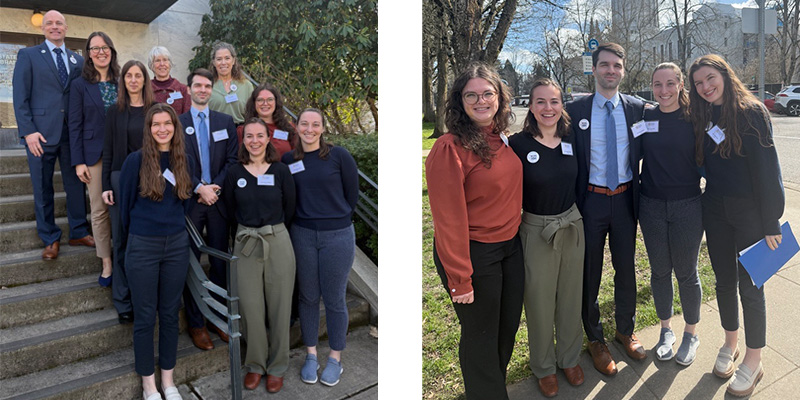Child Advocacy and Community Health Training

Pediatricians play a key role in promoting the health and well-being of children. Therefore, we view advocacy training as a vital part of resident education. Our longitudinal and multifaceted child advocacy curriculum highlights the role of the physician advocate on the individual, community, and legislative level through both didactic and interactive sessions as well as independent rotations. Eventually, residents develop skills that prepare them for their role as lifelong advocates within their communities. The curriculum includes the following elements:
CACH (Child Advocacy & Community Health) Rotation 1
The best learning about our community occurs out in the community. With this in mind, we begin with an exploration of the world in which our patients live by examining demographics, poverty, and how other social drivers of health impact children and families in Portland. Next, residents learn about the resources available in the area to help families. The intern year rotation provides a number of hands-on experiences and observational opportunities including work in safety-net and school-based clinics; visits to WIC and Early Intervention programs; and home visits with a community health nurse. Residents work on independent community-assessment activities and have the opportunity to explore other community-based organizations that work to promote the health of children.
CACH (Child Advocacy & Community Health) Rotation 2
During the third year, residents build upon their prior experience by choosing an advocacy topic to explore in greater detail. Residents use their understanding of the community, and the needs of children within it, to select an issue, identify resources, gather feedback from stakeholders, and craft a possible intervention using an innovative planning tool along with faculty guidance. Residents also participate in additional leadership training through guided exercises, readings, and reflection.
CACH Policy
We have a longitudinal curriculum designed to help residents learn and practice the skills necessary to advocate for children at the legislative level. Residents learn to navigate the Oregon legislative landscape, develop legislative solutions to problems facing child health, communicate effectively with legislators and the media, write an op-ed, and give legislative testimony in a collaborative and supportive group environment. By identifying and addressing a real need of children in our community, we learn the skills together and can employ them to impact the lives of kids here in Portland. This real, hands-on experience allows our residents to truly develop the core skills necessary to become an effective advocate. Faculty for this curriculum include pediatricians, state legislators, community organization members, and media experts.

Resident Advocacy Opportunities
Our residents have been leaders in local, state, and national advocacy projects. From our committed immunization program for families of our patients, to innovative work in food insecurity and early literacy, to national initiatives using social media as an advocacy tool, we remain committed to doing great things for kids! Many OHSU faculty are involved in advocacy efforts at the local, national, and international level and can serve as mentors for residents. Some topics areas include:
- Nutrition: food insecurity, obesity, child nutrition programs, exercise and health promotion
- Early brain and child development: Reach Out and Read and school readiness
- Oral Health: fluoride
- Injury prevention: gun violence, child passenger safety, safe sleep, home safety, poison prevention
- Immunizations
- Foster care
- Child maltreatment
- Adolescent health
- LGBTQ advocacy
- Native American Child Health
- Global health
- Legislative advocacy
- Professional organization leadership (e.g. American Academy of Pediatrics, Oregon Pediatric Society)
Resident CATCH Grants
Residents are encouraged to apply for a Resident CATCH (Community Access to Children’s Health) Grant, administered by the American Academy of Pediatrics. Our institution has both faculty and resident liaisons to this national program who help support the application process and implementation of projects.